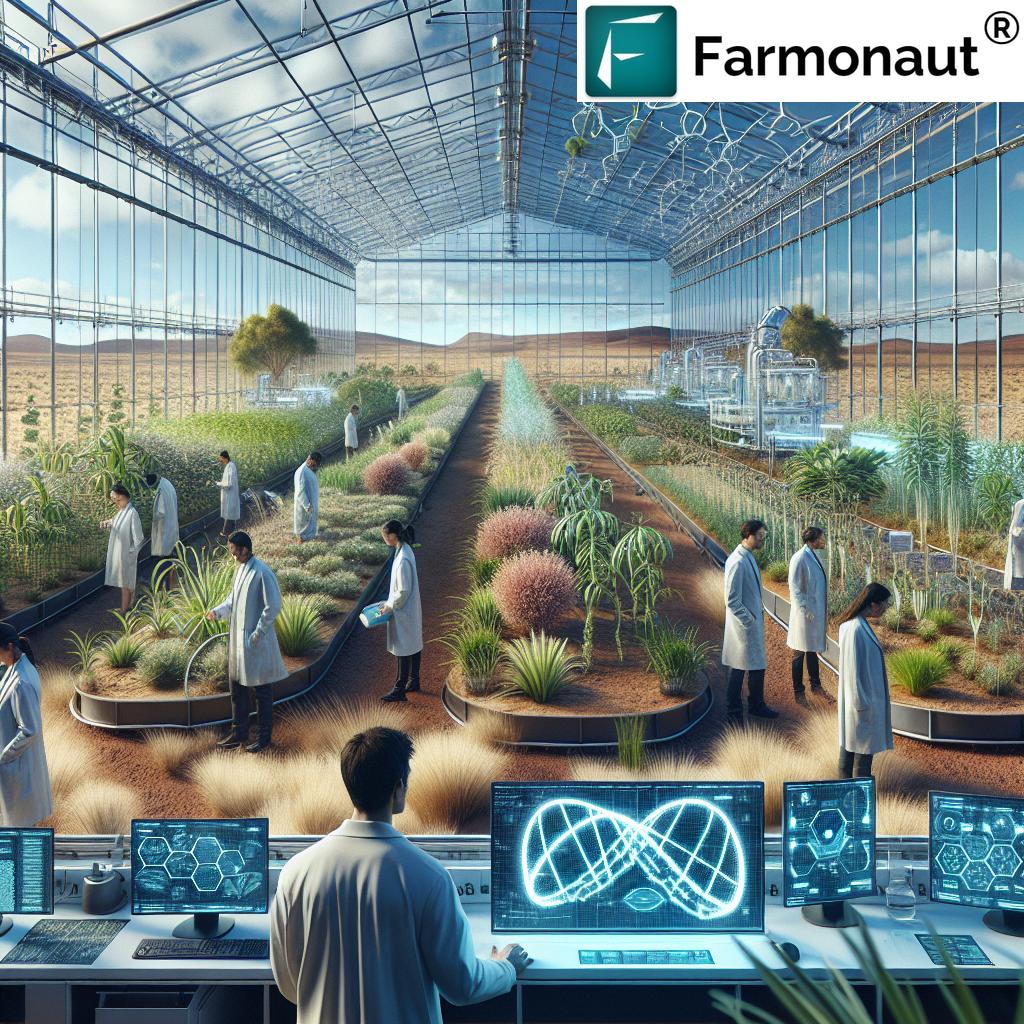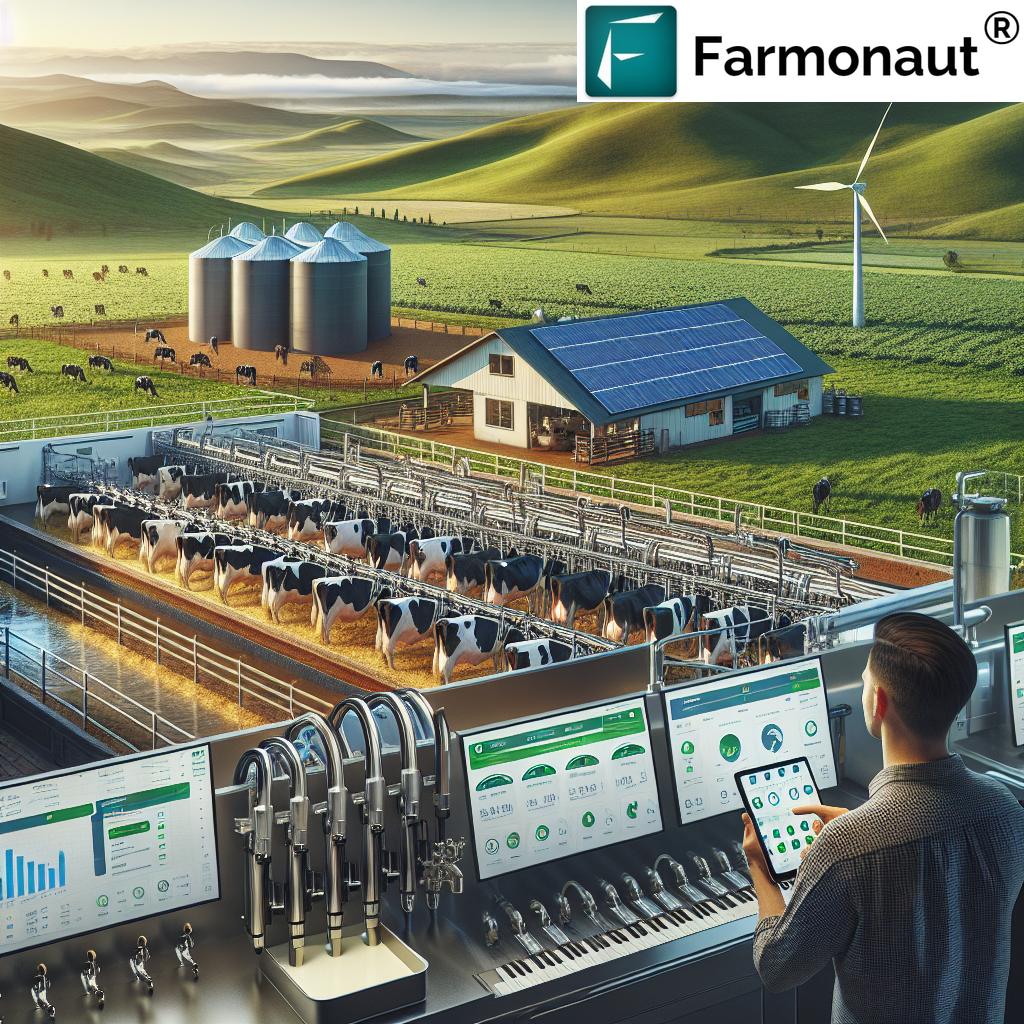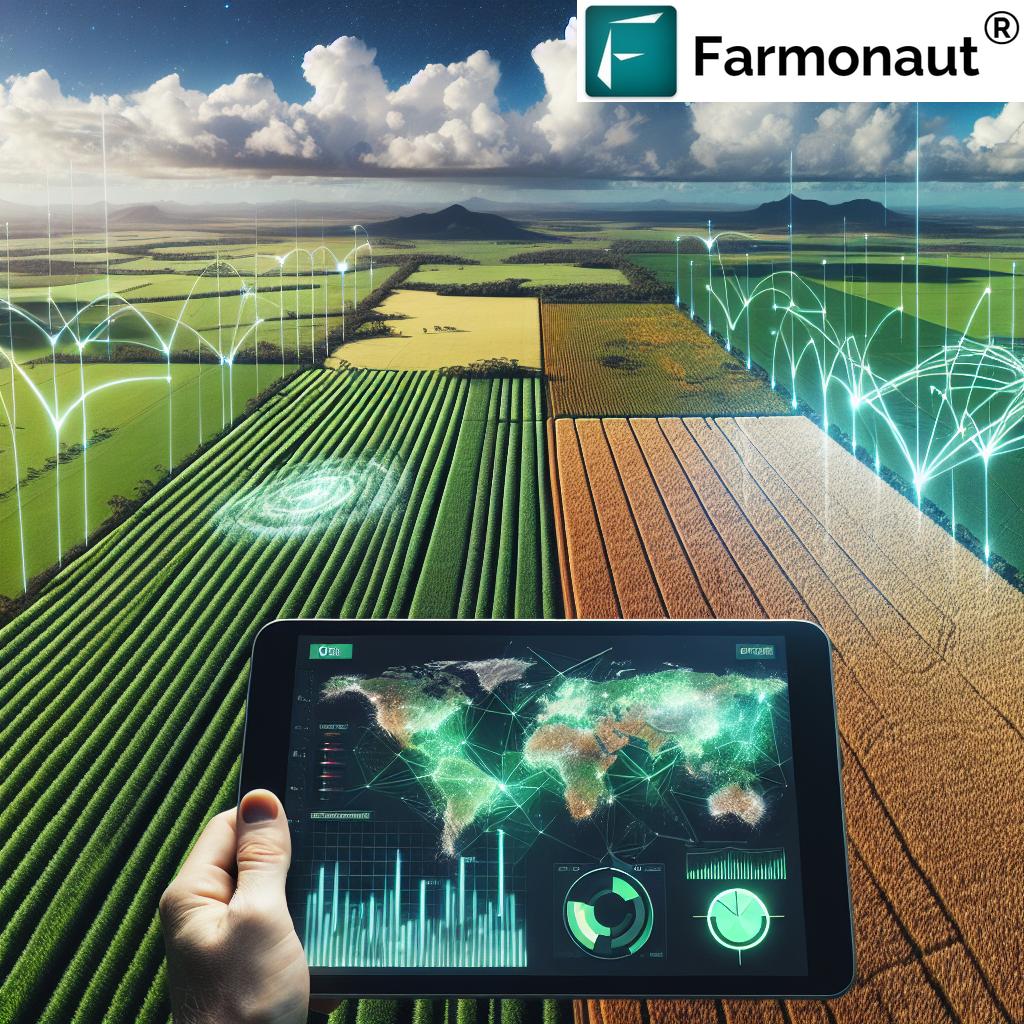Innovative Plant Technologies: Revolutionizing Sustainable Agriculture in Australia
“Australian researchers have developed crops with up to 25% increased salt tolerance, enhancing food security in arid regions.”
In the vast and diverse landscapes of Australia, we are witnessing a remarkable transformation in agriculture. As we face the challenges of climate change and the growing demand for food security, innovative plant technologies are emerging as powerful tools to revolutionize sustainable farming practices. These advancements are not just reshaping how we grow crops; they’re redefining our relationship with the environment and paving the way for a more resilient agricultural future.
At Farmonaut, we’re at the forefront of this agricultural revolution, leveraging cutting-edge satellite technology and data-driven insights to support farmers in their journey towards sustainable and efficient farming. Our mission aligns perfectly with the innovations we’re about to explore, as we strive to make precision agriculture accessible to farmers across Australia and beyond.
The Rise of Sustainable Agriculture Technologies
Sustainable agriculture technologies are rapidly evolving, offering solutions to some of the most pressing challenges faced by farmers in Australia and around the world. These innovations are not just about increasing yields; they’re about creating a harmonious balance between productivity and environmental stewardship.
- Precision Agriculture: Utilizing data from satellites, drones, and IoT devices to optimize resource use
- Biotechnology: Developing crops with enhanced traits for resilience and nutrition
- Smart Irrigation Systems: Conserving water through AI-driven water management
- Vertical Farming: Maximizing space and resources in urban environments
These technologies are transforming the agricultural landscape, allowing farmers to produce more with less, while significantly reducing their environmental footprint. At Farmonaut, we’re proud to contribute to this transformation through our advanced satellite-based farm management solutions.
Crop Engineering for Drought Resilience
In Australia, where water scarcity is a persistent challenge, crop engineering for drought resilience has become a critical area of research and innovation. Scientists are developing plants that can thrive with minimal water, ensuring food production even in the harshest conditions.
Key advancements in drought-resilient crops include:
- Genetic modifications to enhance water use efficiency
- Development of deep-rooted varieties that can access water from lower soil layers
- Breeding for improved stomatal control to reduce water loss
These innovations are not just theoretical; they’re being implemented in fields across Australia, showcasing remarkable results in water conservation and crop yields. Farmonaut’s satellite-based crop health monitoring system complements these advancements by providing real-time data on soil moisture levels, enabling farmers to make informed decisions about irrigation and resource allocation.

Plant-Based Resource Recovery: Nature’s Ingenuity at Work
One of the most fascinating areas of agricultural innovation is plant-based resource recovery. This field draws inspiration from nature’s own mechanisms for extracting and managing resources efficiently. Plants have evolved remarkable abilities to separate, concentrate, and utilize minerals and nutrients from their environment, and scientists are now harnessing these capabilities to develop sustainable solutions for agriculture and beyond.
“Precision separation technologies inspired by plants can recover up to 90% of nutrients from agricultural wastewater for reuse.”
Key areas of plant-based resource recovery include:
- Phytoremediation: Using plants to clean contaminated soils and water
- Biomimetic Membranes: Developing water filtration systems inspired by plant cell membranes
- Root-Inspired Nutrient Extraction: Creating technologies that mimic plant roots’ ability to selectively absorb nutrients
These innovations are not only solving agricultural challenges but are also finding applications in wastewater treatment, environmental cleanup, and sustainable resource management. At Farmonaut, we recognize the potential of these technologies and are exploring ways to integrate them into our precision agriculture solutions.
Precision Separation Technologies: A Game-Changer for Agriculture
Precision separation technologies, inspired by plants’ natural abilities, are revolutionizing how we manage resources in agriculture. These innovative solutions are addressing some of the most pressing challenges in farming, from water scarcity to nutrient management.
Key applications of precision separation technologies in agriculture include:
- Wastewater Recycling: Extracting valuable nutrients from agricultural runoff for reuse
- Soil Contaminant Removal: Selectively removing harmful elements from soil while preserving beneficial nutrients
- Water Purification: Developing more efficient and sustainable methods for cleaning irrigation water
These technologies are not just theoretical concepts; they’re being implemented in farms across Australia, demonstrating significant improvements in resource efficiency and environmental protection. Farmonaut’s satellite-based monitoring systems provide valuable data on soil and crop conditions, helping farmers optimize the use of these precision technologies.
Wastewater Recycling in Agriculture: Closing the Loop
Wastewater recycling is emerging as a crucial strategy for sustainable agriculture, especially in water-scarce regions of Australia. By treating and reusing agricultural wastewater, farmers can conserve precious water resources while also recovering valuable nutrients.
Benefits of wastewater recycling in agriculture:
- Reduction in freshwater consumption
- Recovery of essential nutrients like nitrogen and phosphorus
- Minimization of environmental pollution from agricultural runoff
- Contribution to the circular economy in farming
Innovative technologies, such as membrane filtration and biological treatment systems, are making wastewater recycling more efficient and cost-effective. Farmonaut’s precision agriculture tools can help farmers monitor the impact of recycled water on crop health and soil quality, ensuring optimal use of this valuable resource.
Agricultural Nutrient Management: Precision and Efficiency
Effective nutrient management is crucial for sustainable agriculture, balancing crop needs with environmental protection. Advanced technologies are enabling farmers to apply nutrients with unprecedented precision, reducing waste and environmental impact.
Key aspects of modern agricultural nutrient management:
- Precision Application: Using GPS and sensor technologies for targeted nutrient delivery
- Variable Rate Technology: Adjusting nutrient application rates based on soil and crop needs
- Slow-Release Formulations: Developing fertilizers that release nutrients gradually, matching plant uptake
- Biological Alternatives: Utilizing microorganisms to enhance nutrient availability and uptake
These approaches not only improve crop yields but also significantly reduce nutrient runoff, protecting waterways and ecosystems. Farmonaut’s satellite-based crop monitoring system plays a crucial role in this precision approach, providing farmers with real-time data on crop health and nutrient status.

Innovative Water Purification Methods: Inspired by Nature
Water purification is a critical aspect of sustainable agriculture, especially in Australia where water resources are often scarce and of variable quality. Innovative water purification methods, many inspired by natural processes, are transforming how we clean and reuse water in agricultural settings.
Cutting-edge water purification technologies include:
- Biomimetic Membranes: Inspired by plant cell membranes, these advanced filters can remove contaminants with high efficiency
- Phytoremediation Systems: Using specific plants to clean water by absorbing and metabolizing pollutants
- Solar-Powered Desalination: Harnessing solar energy for sustainable water treatment in remote areas
- Nanotechnology-Based Filters: Utilizing nanomaterials for ultra-fine filtration of water contaminants
These technologies are not only making water purification more effective but also more energy-efficient and environmentally friendly. At Farmonaut, we recognize the importance of water quality in agriculture and are exploring ways to integrate water quality monitoring into our satellite-based farm management systems.
Salt Tolerance in Crops: Adapting to Harsh Environments
Salinity is a significant challenge for agriculture in many parts of Australia. Developing salt-tolerant crops is crucial for maintaining food production in areas affected by soil salinity or where saline water is used for irrigation.
Advancements in salt-tolerant crop development:
- Genetic modification to enhance salt exclusion mechanisms in plants
- Breeding programs focused on selecting naturally salt-tolerant varieties
- Development of crops that can sequester salt in specific tissues, minimizing impact on growth
- Exploration of halophytes (naturally salt-tolerant plants) for agricultural use
These innovations are expanding the range of arable land and improving crop yields in salt-affected areas. Farmonaut’s satellite imagery analysis can help farmers monitor the health of these salt-tolerant crops, ensuring they perform optimally even in challenging conditions.
Circular Economy in Farming: Sustainability in Action
The concept of a circular economy is gaining traction in agriculture, promoting a system where waste is minimized, and resources are reused and recycled. This approach is crucial for creating a more sustainable and resilient agricultural sector in Australia.
Key elements of circular economy in farming:
- Waste-to-Resource Conversion: Transforming agricultural by-products into valuable resources
- Biogas Production: Using organic waste to generate renewable energy
- Composting and Soil Health: Returning organic matter to the soil to improve fertility and structure
- Closed-Loop Nutrient Cycles: Recycling nutrients within the farm system
Implementing circular economy principles in farming not only reduces environmental impact but also creates new economic opportunities for farmers. Farmonaut’s technology supports this approach by providing data-driven insights that help farmers optimize resource use and identify opportunities for recycling and reuse.
Climate Change Adaptation in Agriculture: Building Resilience
Climate change poses significant challenges to agriculture in Australia, from increased frequency of droughts to changing pest and disease patterns. Adapting to these changes is crucial for maintaining food security and agricultural productivity.
Strategies for climate change adaptation in agriculture:
- Diversification of Crops: Growing a wider range of crops to spread risk
- Water-Smart Agriculture: Implementing efficient irrigation systems and water conservation practices
- Precision Agriculture: Using data and technology to optimize resource use and adapt to changing conditions
- Carbon Sequestration: Adopting farming practices that increase soil carbon content
These adaptation strategies are not just about survival; they’re about thriving in a changing climate. Farmonaut’s satellite-based monitoring systems play a crucial role in this adaptation process, providing farmers with real-time data on weather patterns, crop health, and soil conditions, enabling them to make informed decisions in response to changing environmental conditions.
Comparative Analysis of Plant-Inspired Technologies in Sustainable Agriculture
| Technology | Plant Inspiration | Agricultural Application | Environmental Benefit |
|---|---|---|---|
| Precision Separation | Plant root selective absorption | Nutrient recovery from wastewater | Reduced water pollution, resource conservation |
| Drought Resilience | Desert plant adaptations | Water-efficient crop varieties | Water conservation, increased food security |
| Salt Tolerance | Halophyte salt management | Crops for saline soils | Expansion of arable land, soil conservation |
| Phytoremediation | Plant detoxification mechanisms | Soil and water decontamination | Reduced chemical use, ecosystem restoration |
The Role of Farmonaut in Advancing Sustainable Agriculture
At Farmonaut, we’re committed to supporting the implementation of these innovative plant technologies through our advanced satellite-based farm management solutions. Our platform provides farmers with valuable insights that complement and enhance the effectiveness of these sustainable agriculture practices.
- Real-Time Crop Monitoring: Our satellite imagery analysis helps farmers track the health and progress of drought-resistant and salt-tolerant crops.
- Precision Resource Management: By providing accurate data on soil moisture and crop health, we enable farmers to optimize their use of water and nutrients, supporting precision separation and nutrient management technologies.
- Climate Adaptation Support: Our AI-driven advisory system, Jeevn AI, offers personalized recommendations to help farmers adapt to changing climate conditions.
- Sustainable Practice Verification: Our technology can be used to verify and quantify the impact of sustainable farming practices, supporting the transition to a circular economy in agriculture.
We invite you to explore how Farmonaut can support your journey towards more sustainable and resilient farming practices. Visit our website or download our app to learn more about our services and how we can help you implement these innovative plant technologies on your farm.
For developers interested in integrating our satellite and weather data into their own systems, we offer a comprehensive API. Check out our API documentation and developer resources for more information.
Conclusion: A Sustainable Future for Australian Agriculture
The innovative plant technologies we’ve explored are not just theoretical concepts; they’re real solutions being implemented across Australia’s diverse agricultural landscape. From drought-resilient crops to precision separation technologies, these innovations are transforming how we approach farming, making it more sustainable, efficient, and resilient to environmental challenges.
As we continue to face the impacts of climate change and increasing demand for food security, the importance of these technologies cannot be overstated. They represent a path forward that aligns agricultural productivity with environmental stewardship, ensuring that we can continue to feed a growing population while preserving our precious natural resources.
At Farmonaut, we’re excited to be part of this agricultural revolution, providing farmers with the tools and insights they need to implement these innovative technologies effectively. Together, we can build a more sustainable and prosperous future for Australian agriculture.
FAQ: Innovative Plant Technologies in Sustainable Agriculture
- Q: How do plant-inspired technologies contribute to sustainable agriculture?
A: Plant-inspired technologies mimic natural processes for efficient resource use, leading to reduced water and chemical inputs, improved soil health, and enhanced crop resilience. - Q: What role does precision agriculture play in sustainable farming?
A: Precision agriculture uses data and technology to optimize resource use, reducing waste and environmental impact while improving crop yields and quality. - Q: How can farmers implement these innovative technologies?
A: Farmers can start by adopting precision agriculture tools, exploring drought-resistant crop varieties, and implementing water-efficient irrigation systems. Platforms like Farmonaut provide accessible ways to integrate these technologies into farming practices. - Q: What are the environmental benefits of circular economy practices in farming?
A: Circular economy practices in farming reduce waste, conserve resources, and minimize environmental pollution by recycling nutrients and organic matter within the agricultural system. - Q: How does Farmonaut support the implementation of sustainable agriculture technologies?
A: Farmonaut provides satellite-based crop monitoring, AI-driven insights, and precision agriculture tools that help farmers optimize resource use, track crop health, and make informed decisions aligned with sustainable farming practices.
















